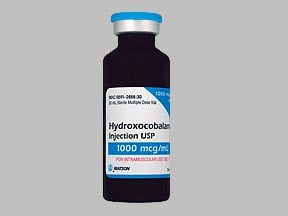
Hydroxocobalamin Acetate Coupons & Savings Card – Discount Prices from $14.10
Generic for: Vb12 max
My prescription
Edit
30ML of 1000MCG/ML, Hydroxocobalamin Acetate (1 Vial)
Select pharmacy

CVS
$47.49
COUPON PRICE
Walmart
$14.10
COUPON PRICE
Walgreens
$23.95
COUPON PRICE
Albertsons
$33.29
COUPON PRICEHydroxocobalamin Acetate savings card
Show this card to your pharmacist
Walmart
$14.10
BIN
ID
PCN
GRP
019876
LHF0C25D79
CHIPPO
LHX
Powered by
Hydroxocobalamin Acetate dosage forms
Dosage Quantity Price from Per unit 30ML of 1000MCG/ML 1 Vial $14.10 $14.10 30ML of 1000MCG/ML 2 Vials $47.20 $23.60 30ML of 1000MCG/ML 3 Vials $80.29 $26.76
| Dosage | Quantity | Price from | Per unit |
|---|---|---|---|
| 30ML of 1000MCG/ML | 1 Vial | $14.10 | $14.10 |
| 30ML of 1000MCG/ML | 2 Vials | $47.20 | $23.60 |
| 30ML of 1000MCG/ML | 3 Vials | $80.29 | $26.76 |
Hydroxocobalamin Acetate Warnings
Hydroxocobalamin acetate, a form of vitamin B12, is generally safe when used appropriately. However, certain risks should be considered:
Allergic Reactions: Individuals with a known allergy to cobalt or any component of hydroxocobalamin acetate should exercise caution, as allergic reactions can occur.
Renal Concerns: There have been reports of acute kidney injury, including conditions like acute tubular necrosis and the presence of calcium oxalate crystals in the urine, following hydroxocobalamin administration. Monitoring kidney function for at least seven days after treatment is advisable.
Blood Pressure Elevation: Hydroxocobalamin may cause significant increases in blood pressure, particularly during or shortly after administration. Blood pressure should be monitored during treatment.
Hypokalemia and Thrombocytosis: In patients with severe megaloblastic anemia, treatment with hydroxocobalamin can lead to low potassium levels (hypokalemia) and an increase in platelet count (thrombocytosis). Monitoring potassium levels and platelet counts during therapy is recommended.
Diagnostic Interference: Hydroxocobalamin can cause a reddish discoloration of urine, which may interfere with certain laboratory tests. Healthcare providers should be aware of this potential interference when interpreting test results.
Administration Route: Hydroxocobalamin acetate is intended for intramuscular injection. Intravenous administration should be avoided to prevent potential complications.
Patients should discuss these risks with their healthcare provider to ensure that hydroxocobalamin acetate is appropriate for their individual health needs.
Hydroxocobalamin Acetate Side Effects
Common side effects:
- Pain at the injection site
- Mild diarrhea
- Itching
- Sensation of swelling throughout the body
Less common but important to monitor:
- Low potassium levels (hypokalemia)
- Muscle cramps
- Weakness
- Irregular heartbeat
- Symptoms related to polycythemia vera
- Chest pain
- Shortness of breath
- Weakness on one side of the body
- Sudden vision changes
- Difficulty speaking
Serious side effects:
- Serious allergic reactions
- Rash
- Significant itching or swelling, particularly of the face, tongue, or throat
- Severe dizziness
- Trouble breathing
Hydroxocobalamin Acetate Interactions
Hydroxocobalamin acetate, a form of vitamin B12, can interact with certain medications and substances, potentially affecting its effectiveness or leading to adverse effects. It's important to be aware of these interactions:
Antibiotics: The antibiotic Chloramphenicol may reduce the therapeutic response to hydroxocobalamin, particularly in treating anemia.
Oral Contraceptives: Use of oral contraceptives can lower serum concentrations of hydroxocobalamin.
Folic Acid: High doses of folic acid may decrease vitamin B12 concentrations, potentially diminishing the effectiveness of hydroxocobalamin.
Intravenous Incompatibilities: Hydroxocobalamin is physically incompatible with certain intravenous medications, including Diazepam, dobutamine, dopamine, Fentanyl, Nitroglycerin, pentobarbital, propofol, and thiopental. It is also chemically incompatible with ascorbic acid, Sodium Thiosulfate, and sodium nitrite. Therefore, these substances should not be administered simultaneously through the same intravenous line as hydroxocobalamin.
Blood Products: Co-administration of hydroxocobalamin with blood products (such as whole blood, packed red cells, platelet concentrate, or fresh frozen plasma) through the same intravenous line is not recommended. If both are necessary, they should be administered through separate intravenous lines, preferably on opposite limbs.
Medical Conditions: Conditions like infections, uremia, or deficiencies in folic acid or iron may impair the therapeutic response to hydroxocobalamin.
Pregnancy and Breastfeeding: Hydroxocobalamin crosses the placental barrier and is excreted in breast milk. Its use during pregnancy and breastfeeding should be considered only if the potential benefits outweigh the risks.
Always inform your healthcare provider about all medications, supplements, and medical conditions before starting hydroxocobalamin acetate to ensure safe and effective treatment.
